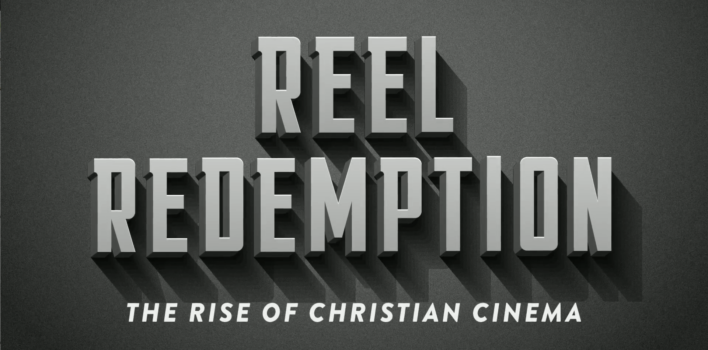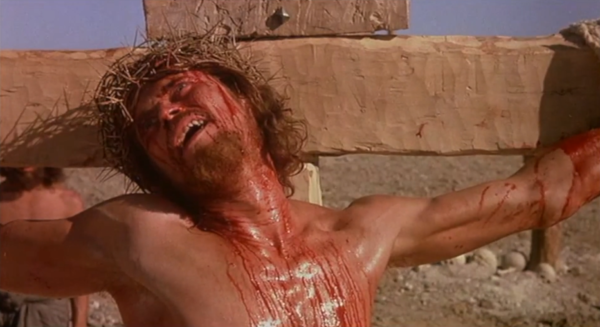Review| Reel Redemption
 Reel Redemption is a visual essay by film critic and academic Tyler Smith about the conflicts between Hollywood and Christianity. He has a solid grasp on how we got to where we are, and in just under an hour, with only one viewing, I felt like I suddenly had a good hold on that entire history myself. I genuinely did not expect to come away feeling so well informed. It’s quite an accomplishment—for him as a teacher, not for me as a viewer.
Reel Redemption is a visual essay by film critic and academic Tyler Smith about the conflicts between Hollywood and Christianity. He has a solid grasp on how we got to where we are, and in just under an hour, with only one viewing, I felt like I suddenly had a good hold on that entire history myself. I genuinely did not expect to come away feeling so well informed. It’s quite an accomplishment—for him as a teacher, not for me as a viewer.
Tyler is probably uniquely qualified to cover this topic. He has a Master’s degree in Cinema and Media Studies, and has given talks at the International Christian Film Festival, the Hollywood Divine Film Festival, Alpha Omega Con, on panels at Azusa Pacific University and Biola University, as well as on the panel “Spiritual Themes in Comics” at WonderCon. He must be approaching his 10,000 hours of expertise in general film criticism, many of which can be listened to via 13 unbroken years of weekly episodes of Battleship Pretension, along with almost 10 years on his own Christianity-focused film program, More Than One Lesson, both of which also feature years’ worth of written reviews and analyses.
“…he’s bona fide!”
—Penny, O Brother, Where Art Thou?
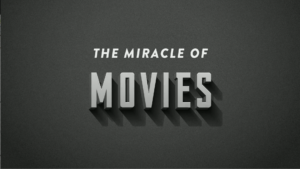 Those already used to his jocular podcasting voice will find his tone comparatively measured and respectable. This is for a different audience, many of whom could be on one side of a cultural divide which rarely takes the other seriously. It’s an effective choice, encouraging any viewer to at least take him seriously.
Those already used to his jocular podcasting voice will find his tone comparatively measured and respectable. This is for a different audience, many of whom could be on one side of a cultural divide which rarely takes the other seriously. It’s an effective choice, encouraging any viewer to at least take him seriously.
The film comes in small segments, each divided by a title card. He begins with a primer on film history through the silents, then primarily hits on the eras of film history relevant to this subject. This section starts with the Hays Code, Hollywood’s attempt to combat a rising perception that the land of dreams was a den of iniquity and check a likely government censorship law through self-censorship. Post-World War II film noir introduced cynicism in cinematic portrayals of leaders, society and human relationships, but generally not yet of religion. Tyler covers the complex effects of the Red Scare on Christianity in film through perfectly selected film clips from movies like The Seventh Seal and On The Waterfront. These aren’t the obvious, quotable or meme-able scenes, yet they fully represent the films’ places in the progress of this now fractious relationship. The deceptively complex Night of the Hunter is perfectly contextualized.
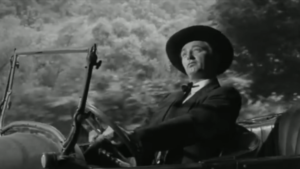 When the production code falls away and the divide between secular cinema and Christian cinema finally arises, Reel Redemption does a particularly nice job with illustrations. It shows well how God has been cinematically portrayed in unnecessarily insufficient ways. Tyler is more gracious about those limitations than I am, and probably more thoughtful as well. I appreciate that he doesn’t steer away from the sneering reactions on both sides in his Last Temptation of Christ segment, where he could have presented only one stand as reasonable. Likewise, in the Simpsons parody of the Left Behind movies, it’s easy to see both its accuracy and its mean-spiritedness; another perfectly presented clip. Then Tyler has positive things to say about Pulp Fiction. 30 minutes in, it’s close to his first opinion; and a risky move, as those who are watching in hopes of answering the question “Whose side is he on” might switch off.
When the production code falls away and the divide between secular cinema and Christian cinema finally arises, Reel Redemption does a particularly nice job with illustrations. It shows well how God has been cinematically portrayed in unnecessarily insufficient ways. Tyler is more gracious about those limitations than I am, and probably more thoughtful as well. I appreciate that he doesn’t steer away from the sneering reactions on both sides in his Last Temptation of Christ segment, where he could have presented only one stand as reasonable. Likewise, in the Simpsons parody of the Left Behind movies, it’s easy to see both its accuracy and its mean-spiritedness; another perfectly presented clip. Then Tyler has positive things to say about Pulp Fiction. 30 minutes in, it’s close to his first opinion; and a risky move, as those who are watching in hopes of answering the question “Whose side is he on” might switch off.
One of the tough parts of watching a documentary can come when it covers known territory, and I do know most of this stuff; but it was a pure pleasure to see the setup and underpinnings of Christians vs. Hollywood so swiftly and precisely covered that 40 minutes in, it was hard to imagine either side not understanding the other, should they engage with this film. Again, that’s quite an accomplishment.
 Then he recounts the development of the contemporary Christian Social Drama. This was mostly new for me, having happened peripheral to my interests. His approach to Christian film as a moviegoer and film critic, not as a Christian Culture Defender, has not stopped him from keeping up with it as it did me, so this coverage plugged a hole in my film history knowledge. He covers Tyler Perry, Sherwood Pictures, David A.R. White & Pure Flix, previously mere names in vapor to this lover of cinema and its annals. I’ve simply never had any interest in these movies.
Then he recounts the development of the contemporary Christian Social Drama. This was mostly new for me, having happened peripheral to my interests. His approach to Christian film as a moviegoer and film critic, not as a Christian Culture Defender, has not stopped him from keeping up with it as it did me, so this coverage plugged a hole in my film history knowledge. He covers Tyler Perry, Sherwood Pictures, David A.R. White & Pure Flix, previously mere names in vapor to this lover of cinema and its annals. I’ve simply never had any interest in these movies.
Does their being a genre change that interest? As the film nears its ending, Tyler makes a case that Christian Social Drama is one, if one in the early stages. That’s his conclusion. I agree with most of his cited weaknesses that tend to characterize these films, the sort which usually affect our abilities to connect with any movie: wooden acting, simplistic dialogue and overly message-driven writing. 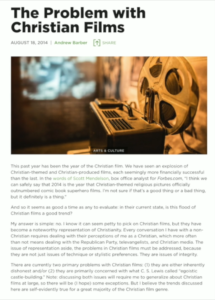 Does being a genre cover those? Would it cover other genres’ weaknesses? Do we give a pass to intuitively unreal physics in action movies? I don’t, but most do. Do we accept the sometimes unrealistic acting in Hollywood musicals? I do that one. Yet I’m still no more inclined to look at Christian Social Drama films, nor to reevaluate them. That comparison of how we will overlook certain weaknesses in certain kinds of movies is not one Reel Redemption addresses, at least regarding the weaknesses of quality. Also, if Christian Social Drama is indeed becoming a genre, it’s in an embryonic stage. The case made for it may seem either weak, or as it was to me, immaterial.
Does being a genre cover those? Would it cover other genres’ weaknesses? Do we give a pass to intuitively unreal physics in action movies? I don’t, but most do. Do we accept the sometimes unrealistic acting in Hollywood musicals? I do that one. Yet I’m still no more inclined to look at Christian Social Drama films, nor to reevaluate them. That comparison of how we will overlook certain weaknesses in certain kinds of movies is not one Reel Redemption addresses, at least regarding the weaknesses of quality. Also, if Christian Social Drama is indeed becoming a genre, it’s in an embryonic stage. The case made for it may seem either weak, or as it was to me, immaterial.
But that’s a quibble at worst. The bulk of the movie is so rich, well Illustrated, and informative that this is worth noting only to prevent disappointment. If you expect your documentaries to have slam-bang, revelatory, or twist endings, well, this just isn’t that kind of program.
And it’s worthwhile enough that it doesn’t need to be.
Reel Redemption will be available on Faithlife TV on March 4.
Full Disclosure: I’ve listened to Tyler’s shows for quite a few years, and enjoy his friendship with show partner David Bax enough to toss them 5 bucks a month to eavesdrop on their extra chats. Reel World Theology was also provided a review copy of this film.


